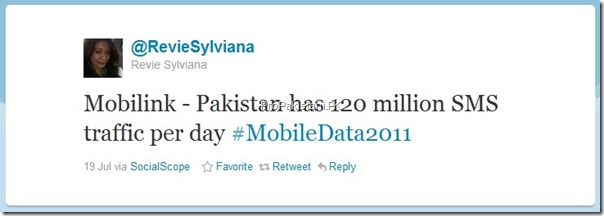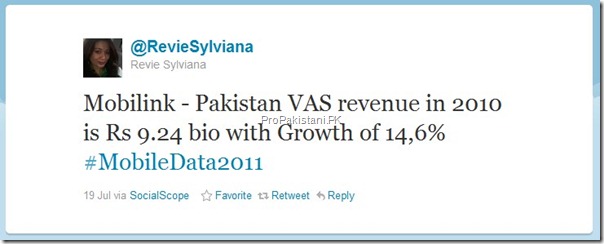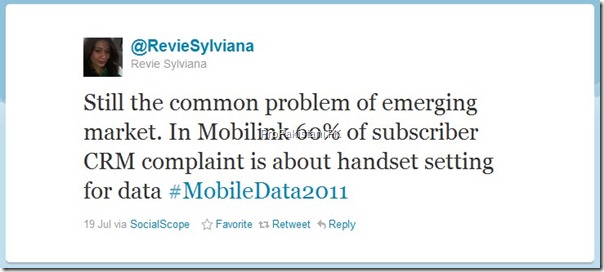Malaysia played host to a two day conference and workshop program called ‘Mobile Data 2011’ on 19 July. Organized by the International Quality & Productivity Center, the discussion at the heart of the conference was the innovative approaches and drivers in practice by various operators across South East Asia in enhancing data usage on the mobile platform.
Pakistan, for one reason or another, gets classified in the Middle East and Africa (MEA) region and hence, no high profile speaker or representative of our immense mobile telecom sector was slated to grace the event. Yet, the country appeared to hold high interest from the attendees, especially one.
Revie Sylviana, GM for VAS at Bakrie, was one of the speakers at the event with a concentration on the drivers needed to increase mobile data penetration in emerging markets.
Bakrie & Brothers is one of Indonesia’s largest corporations with 28 subsidiaries in different industries, including Bakrie Telecom (BTel). Using her Twitter account, Revie shared some insights from the conference on matters closer to home.
In the past 4 years, Pakistan’s mobile communication sector has shown a smarter understanding towards the market. As voice traffic plateaued to a steady region, SMS usage took over to utilize the bandwidth available.
Add to that the bundle packages and buckets being promoted by the operators, it explains how Pakistan consumed almost 151 billion messages in 2009, according to a report by the International Telecommunication Union, and placed 5th in the world for SMS usage.
Based on the number tweeted by Revie, it would give Mobilink a significant share of Pakistan’s SMS pie, with a figure around 44 billion for the year.
Value Added Services (VAS) has effectively become one of the largest revenue streams for mobile operators across Pakistan, if not the world. The segment covers all aspects of mobile data transmission other than voice, like SMS/MMS, GPRS/EDGE, handsets, Blackberry, customized solutions, etc.
The recent battle on the smartphone arena by mobile operators is linked to the VAS segment showing impressive growth. While Blackberry was the initial driver between 2008 and 2010, the last year has shown a shift in trend towards Android.
This in part is due to the smartphone manufacturers creating devices for consumers of all spending limits, but more linked with the operator push to increase the 5% users of mobile data.
One question is arising: with WiMAX operators seeking to diversify their revenue streams by introducing devices built to work with their networks, mobile communication operators could have more competition in the market and would need to become more proactive, rather than reactive.
Mobile service operators in Pakistan were reluctant to strategize with handsets when the market was maturing. One of the reasons for this is financial liability for the companies and the lack of credit checking services or recovery solutions in the country.
The only mode was to have consumers pay in full for devices, or bundle annual usage within a bundle cost of a handset. Another reason could be the structuring of the operators, who have never viewed themselves as handset sellers, but more as service providers only.
The emergence of the grey market for mobile devices in Pakistan is connected to this. While manufacturers utilize the presence and reach of operators to launch devices in developed countries, primarily as consumers prefer package purchase instead of outright handsets, the path for Pakistan is to launch in market without using the operators. Add to this the large scale inward movement of devices from the Western consumers, and Pakistan becomes a jungle of mobile handsets.
For operators, the lack of a streamlined handset unit to test every handset in the market means an absence of knowledge to help the consumer. For data settings to be pushed by the operator, the device must have been tested. Otherwise, manual configurations are implemented only by visiting a customer center. This means a delay, and every delay means loss of revenue.
Similar cases exist in other emerging markets like Turkey, Poland and Nigeria. With the potential held in the emerging block, Revie suggests that by 2014, 36 percent of global mobile data revenues will come from nations in this group. This seems to be supported by the figures coming from ventures like mobile banking, and will have further growth if NFC (Near Field Communication) takes off across the world.
While Pakistan remains devoid of 3G or 4G, and its 100 million plus subscribers still remain largely focused on voice, there is little to no objection that mobile data is the new frontier for competition, and the growing revenue source for the operators. The Pakistani market appears to hold significant interest for operators and analysts worldwide, and Mobilink just got regional/global publicity.





























THE WORST I THINK ABT THIS COMPANY IS THAT VALIDITY IS VERY LOW AND RECHAGE AMOUNT IS OFTEN VERY HIGH!! And It is only after money….NO MMS!! SO OUTRAGEOUS COMPANY!!!
Totally Agreed !!
there is no staff in there office after 1:00 am when you call in there service centre there is no operator who answer. and there recharge amount he very very high… mobolink suckxxx
This is simply the best thing that could happen to our telecom industry. Not only does it make us proud but also honors Mobilink and its efforts.
After all, Mobilink was the first ever telco to hit Pakistan and no one can change that. Good going!
Now that was a good read
I bet 60 Mil SMS would have been complain sms…
And the remaining 60 Mil from Mobilink to costumers begging to use their service.
Telecom companies should thank Zardari for the increase number of SMSes because most of the SMSes are about him!